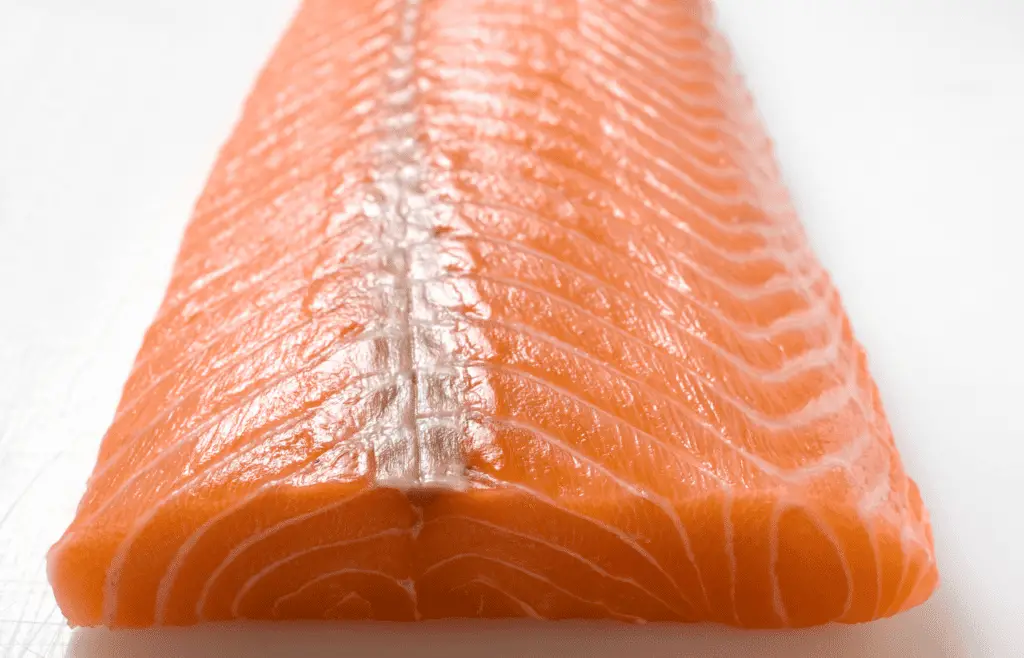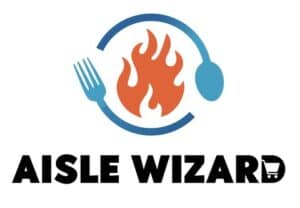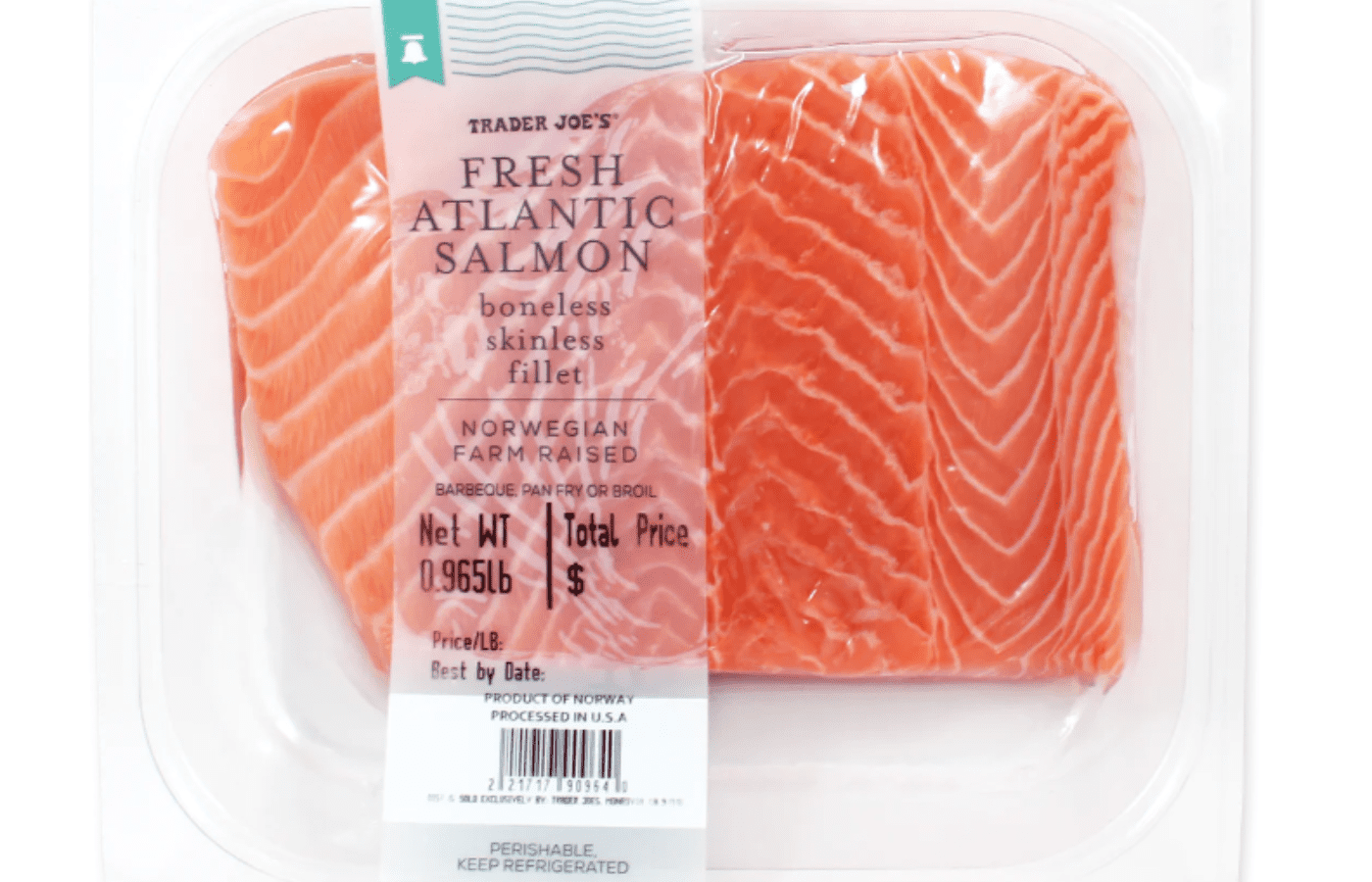Trader Joe’s is well-liked by American grocery shoppers for providing niche food choices and groceries that you simply can’t find anywhere else. They even have a wide selection of dietary-compliant foods. The question is, Is Trader Joe’s Salmon kosher?
Trader Joe’s Salmon is considered kosher despite the fact that they are sold in skinless filets. Although the presence of scales and fins are usually what is used to determine whether or not fish meet kosher standards and are therefore kosher-safe, salmon is the exception because of their pinkish color, according to the Orthodox Union.
In this article, we will give you an understanding of kosher foods if you weren’t aware of those standards already. We will also provide an overview of Trader Joe’s salmon products, the kosher certification, and the importance of that certification when it comes to Jewish consumers and other consumers. We’ll finish with answers to frequently asked questions!
Understanding Kosher Foods
The word “Kosher” means a food that is in compliance with the standards of diet for Jewish traditional law. This is not only a standard of safety and health, but religious reverence.
Kosher can be observed by Jewish communities, but some individuals may choose not to follow this set of dietary rules.
There are three types of combinations of food that are considered non-kosher and forbidden for Jewish people adhering to traditional laws to consume. These are listed below:
- Milchig – Milchig is considered any kind of milk, yogurt, cheese, or butter that has touched meat or pareve or the instruments used to prepare those two other categories.
- Fleishig – Fleighig is considered any meat such as fowl or mammals, or any kinds of gelatin or other meat by products like broth and bones, which touch milchig or pareve or the instruments used to prepare them.
- Pareve – Pareve is considered food that doesn’t fall into the above-two categories, such as eggs, plants and plant-based food, and fish such as salmon.
These are never allowed to be combined, either directly or indirectly. It is not even permitted for meat and dairy to share a sink.
Before a person sticking to the kosher rules can eat one of the above categories of food after eating a different category, they must wait anywhere between 1 or 6 hours.
Trader Joe’s Salmon Products

Trader Joe’s offers two types of salmon. One is under their BBQ Cut brand, and is called “Fresh Atlantic Salmon.” The other is “Fresh Atlantic Salmon Boneless.” Both are cut into fillets and packaged in plastic, albeit in different shapes, and each costs about $10 after U.S. tax.
These are sourced from salmon farms along the Atlantic coast of Norway and are shipped for optimum freshness.
It should be noted that Trader Joe’s website does not offer much information on how their salmon is prepared, though they do specify that the fish are raised without antibiotics.
It is also very important to note that neither cut of Trader Joe’s Salmon products feature any sort of kosher certification, which will be explored in more in-depth information below. Instead, the labels on Trader Joe’s two salmon products are merely there to denote which type of cut the filets have been shaped into.
Kosher Certification of Trader Joe’s Salmon
Kosher certification is awarded y any kosher certification agency, which can be an organization or authority that grants an item or food the term “hechsher,” which is a seal of approval. It verifies that the product is in compliance with Jewish law and tradition.
There are five main agencies in the United States which are known for providing certification of kosher status to retail foods for the information of consumers. These five are the Ok, the OU, the Star-K, the KOF-K, and the CRC.
For a food to be certified by one of these, the client must request certification and then supply a list of the ingredients and machinery and cleaning agents used in the process.
Then a rabbi will walk through the facility where the food is prepared to be sure that the production processes and equipment do not disqualify the food product from certification.
Usually, a food that has received certification is allowed to display, on its packaging, a symbol of the agency to show that it has been certified.
However, Trader Joe’s salmon products are not kosher certified.
Importance of Kosher Certification For Jewish Consumers
Kosher certification is relatively new in the long tradition of Jewish law. OU Kosher was founded by the Orthodox Union in 1923 when so many industrially created food products were becoming available for purchase and use.
That being said, many kosher observers rely on the certification of foods to be sure that they are not violating Jewish law when eating.
According to the authorities of the Torah, or Jewish law, foods that are non-kosher can actually be more harmful to the soul than they are to the body.
In fact, only when a person is in danger of starvation or sickness without eating non-kosher foods is it permitted.
Actually, according to Food Dive’s report, by 2022, consumers actually believe that kosher’s certification denotes a food’s healthy, clean preparation, regardless of it’s connection to Jewish law.
Consumer Attitudes Toward Kosher Foods
The understanding of Kosher certification is not necessarily mainstream. As previously mentioned, even those who do not observe Jewish law will sometimes purchase a product after seeing the “kosher” symbol because it is popularly believed that these foods are prepared with an extra standard of cleanliness.
Additionally, some consumers may find themselves all the more inclined to purchase kosher foods since the COVID-19 pandemic.
This is because some kosher-approved factories and industries were forced to produce at a lower rate due to the global health crisis, resulting in some shortages.
Frequently Asked Questions
Can’t get enough information about kosher, kosher certification, Trader Joe’s, and salmon? We have you covered with our answers to some of these topics’ most frequently asked questions in the section provided below.
Where Does Trader Joe’s Salmon Come From?
Trader Joe’s gets their salmon from salmon farms like those at the edge of the northern Norway coast of the Atlantic Ocean.
Which Salmon Is Kosher?
Any salmon that has the typical pinkish red coloration of typical salmon is considered kosher by the Orthodox Union, including trout.
Can You Buy Fresh Salmon Without a Hechsher?
A Hechsher is defined as a product certification that is rabbinical, which qualifies certain foods or items as conforming to Jewish law requirements.
According to OU Kosher Certification, however, it is allowed for raw salmon to be purchased from non-certified sources due to the unique pinkish nature of the fish.
Final Thoughts
To sum it all up, Trader Joe’s salmon may not have a kosher certification, but most rabbinic authorities accept salmon as kosher-approved due to the coloration of the fish, even when it is skinned. This is remarkable because typically, fish can only be thought of as kosher if fins and scales are present.
If you aren’t sure that a product which is not kosher-certified is for you, Trader Joe’s recommends their kosher products such as Fair Trade Organic Sumatra Coffee or their Organic Trofie Pasta.
Altogether, a person’s kosher standards are their own, and if Trader Joe’s salmon does not meet those standards, their other products may serve as a replacement!

